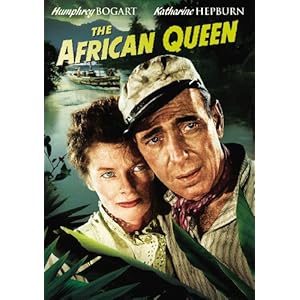Here is a brief summary about my movie watching and the fact that these movies are all movies and that I like watching movies.
The African Queen

Some weird combination of an adventure, a buddy road picture, and a romantic comedy, The African Queen rests almost entirely on the shoulders of its two leads, played excellently as always by Humphrey Bogart and Katharine Hepburn. He's an eccentric, hard-drinking boatman and she's an uptight religious woman, so the conflict between them is obvious at first, but the way their relationship develops as they face the various perils of their journey through the waters of Africa is constantly intriguing. I haven't fallen in love with any of John Huston's work yet, but he's nothing if not an extremely competent director in a variety of styles and moods. Good ending, too.
Gone with the Wind

For the 1930s, this is a pretty darn remarkable technical achievement. Vivien Leigh and especially Clark Gable do really good jobs in their roles. And those are about the only truly positive things I have to say about this film. It's an overly long story with not a whole lot of real enjoyable substance. Scarlett doesn't have much character beyond being an opportunistic homewrecker, and there's no really great alternatives to latch on to. I don't require characters in a story to be likable, but there's gotta be something, and this just seemed like a long series of unfortunate romantic events set (pretty effectively) against a dramatic historical backdrop.
The Sugarland Express

Steven Spielberg's first real theatrical film isn't bad, though it isn't great either. Goldie Hawn stars as a troubled young woman who breaks her husband out of what's basically a halfway house I guess to help rescue their young child from his adoptive parents. They end up getting chased by the police, holding one hostage, and leading them all on a grand chase across the country to Sugarland, where their kid lives. There's some humor and some brief action and some family drama. The most interesting part is the relationship that grows between the couple and their captive over the couple days the story takes place in. Other than that, it tends to drag here and there. There should be more urgency to a chase movie than this. It's mostly based on a true story, which is probably more remarkable than the film itself. You can definitely see the promise his career would later capitalize on.
Tootsie

I've seen parts of this before, but this is my first time watching the thing start to finish. I'm not usually a patron of films heavily featuring cross-dressing main characters, but the difference between most of them and Tootsie as I see it is they don't bother to make their female counterparts compelling in any way, while Michael Dorsey's Dorothy Michaels alter-ego becomes a full character in her own right. Dustin Hoffman is great, Bill Murray is possibly more great in a smaller role as his roommate, and the film is a nice combination of a truly funny comedy and a solid romantic drama about people who want what they can't have. It was a little too early 80s for my taste in places, but for the most part Tootsie is just a likable, fun movie from start to finish.
Thursday, August 11, 2011
Movie Update 13
Tuesday, January 4, 2011
A Streetcar Named Desire

As far as I'm concerned, Desire really has two things going on at this point: it's a notable risque and sexually-charged film for the time, and Marlon Brando's performance, which was somehow the only one out of the four nominated for Oscars to not win that year. Otherwise it's pretty standard. Vivien Leigh plays Blanche, who moves from the family plantation to her sister's apartment in New Orleans under mysterious circumstances, and begins to clash immediately with her brother-in-law, Brando's Stanley. Stanley is a crass, mean drunk, and Blanche a completely self-deluding liar, so the two butt heads pretty heavily. Her sister Stella tries to keep the peace, but she's torn between her devotion to both of them. Stanley is rightly curious as to why his wife is suddenly without the valuable plantation property, and sets to find out what the truth about Blanche really is, and it's not a pretty one. There is a lot of yelling and eventually some actions that can never be taken back.
To be honest, I had quite a bit of trouble watching Leigh's character in this one. It's not that Blanche isn't at least a little sympathetic, it's just that with both the way that she's written and the way she's performed, she's hard to take seriously. She's always giving grand speeches and talking about herself for minutes on end, and you just get fed up with listening to it. In a way it helps put you in Stanley's mindset, but that's not exactly a person I want to find myself agreeing with. Brando really does give a hell of a performance, though. He's a totally commanding presence for every second he's on screen, and he is just doing stuff that viewers at the time had never seen before. He tears around the set, shouting and mumbling his lines, and it's just arresting in a way that classical stage acting isn't. No one else in the movie is really operating on his level, but his work manages to elevate the film rather than the rest of it dragging him down. I was pretty ready for it to be over by the end, but it was a worthwhile watch simply for the history of it. If they ever decided to update it though, they'd really have to take a chainsaw to those Blanche monologues.

































